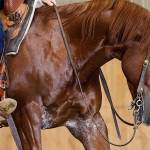Antioxidant Supplementation in Horses Protects Muscle, Doesn’t Inhibit Muscle Growth

Horses are often given antioxidant supplements to decrease damage caused by reactive oxygen species (ROS), a normal by-product of exercise. High levels of antioxidants, however, were thought to block beneficial effects of ROS, such as muscle building. A recent study found that antioxidants did not inhibit muscle accretion in horses as previously suspected.*
In the study, 18 Thoroughbred-cross polo ponies from a university teaching herd were divided into three groups: a control group fed a low-antioxidant diet; a group fed a high-antioxidant diet; and a group fed a high-antioxidant diet with branched-chain amino acids. Vitamin E was selected as the antioxidant in this study. The control diet contained 840 IU of vitamin E, while the diets supplemented with antioxidants contained 1,580 IU of vitamin E.
All horses underwent an intensive exercise test on day 0 and again 15 and 30 days after supplementation began. Blood samples were collected to measure oxidative stress and muscle protein synthesis, the latter of which was determined by looking at specific muscle protein genes and their expression.
“Researchers found that antioxidant supplementation stimulated protein synthesis after exercise by day 30 of the study. This supports results from studies conducted at Kentucky Equine Research showing that supplementing with the antioxidant N-acetyl cysteine did not have a detrimental effect on protein synthesis,” explained Catherine Whitehouse, M.S., a nutrition advisor for Kentucky Equine Research.
Further, the researchers observed that adding a BCAA supplement with the antioxidant provided no additional benefit.
“This agrees with other studies that report exercise can be the greatest stimulant for protein synthesis. It is also important to note that this study measured changes in gene expression and not specific proteins stimulated by the gene expressions analyzed,” said Whitehouse.
Finally, the data suggested that the antioxidants in the control diet helped mitigate oxidative stress after exercise. But, improved fitness of the horses could also be a factor in improved antioxidant defenses, Whitehouse suggested.
Nano-E, a liquid, natural-source vitamin E supplement developed by Kentucky Equine Research, is rapidly utilized by the horse to increase vitamin E status.
“Performance horses with limited access to grazing fresh pasture benefit from receiving this type of supplementation to mitigate oxidative damage. The high bioavailability of Nano-E means owners can deliver additional support as needed following intense exercise or competition,” advised Whitehouse.
*Kent, E., S. Coleman, J. Bruemmer, R. Casagrande, C. Levihn, G. Romo, K. Herkelman, and T. Hess. 2023. Comparison of an antioxidant source and antioxidant plus BCAA on athletic performance and post exercise recovery of horses. Journal of Equine Veterinary Science:104200.








